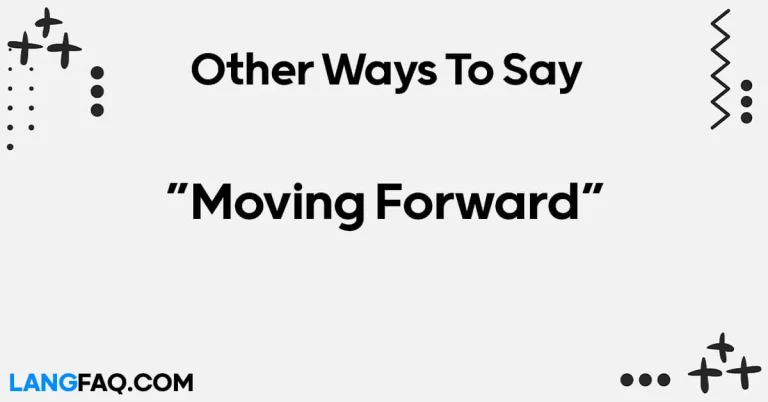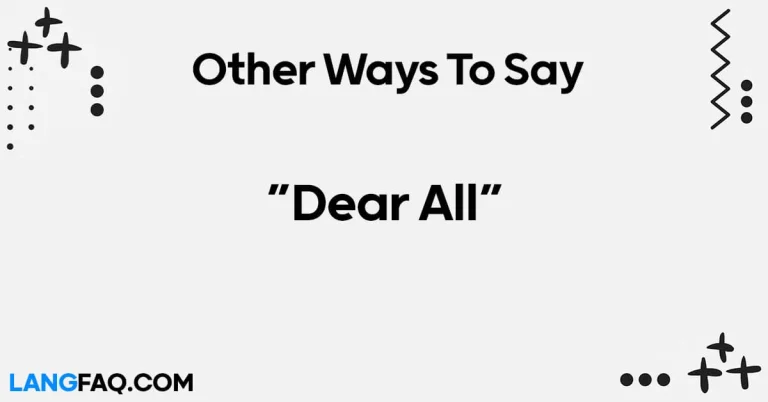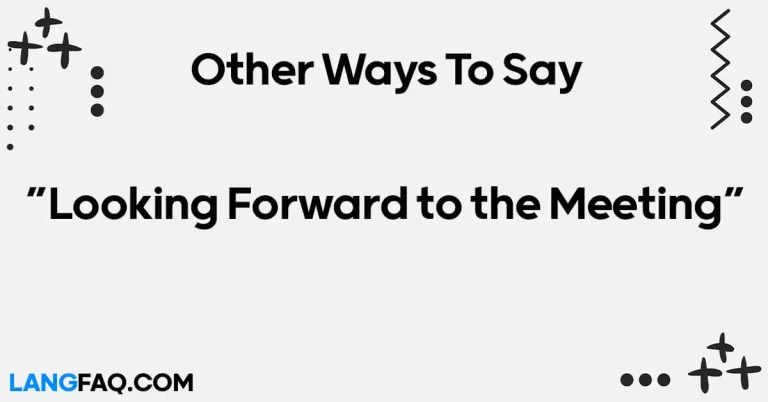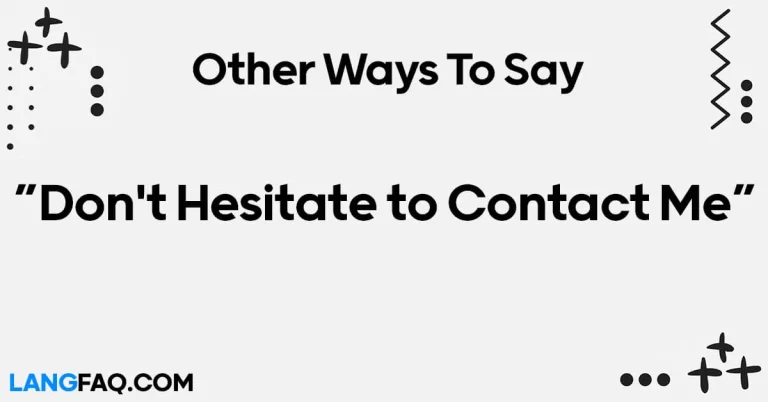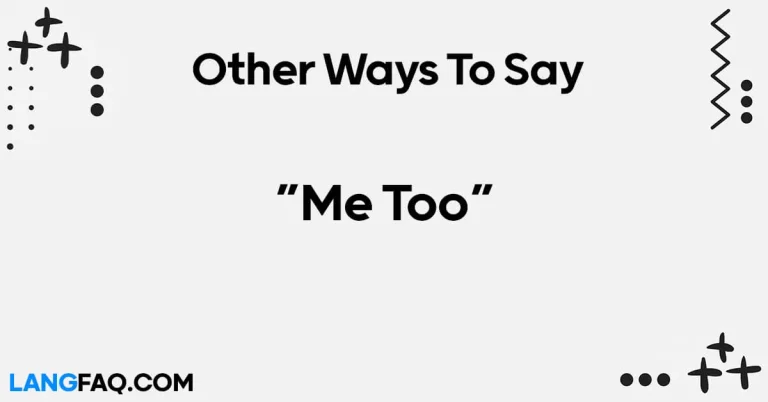Juggling a hectic schedule is a common challenge in today’s fast-paced world. In this comprehensive guide, we’ll explore unique ways to express that your timetable is full, providing you with alternatives that add flair to your communication. Whether you’re a professional, student, or someone navigating the intricacies of a busy life, these phrases will help you articulate your packed schedule more creatively and effectively.
12 Other Ways to Say “My Schedule Is Full”
Here are 12 alternative ways to express “My Schedule Is Full”:
- I’m at full capacity.
- My timetable is completely booked.
- There’s no room in my schedule.
- I have a packed agenda.
- Every moment is spoken for.
- I’m swamped with commitments.
- My calendar is brimming with tasks.
- I’m tied up with prior engagements.
- I’m immersed in a flurry of activities.
- I have a hectic timetable.
- My plate is full.
- I’m knee-deep in appointments.
Here’s a table with meanings and examples for the 12 alternative ways to say “My Schedule Is Full”:
| Expression | Meaning | Example |
|---|---|---|
| 1. I’m at full capacity. | Completely occupied or unable to take on more tasks. | “I can’t attend the meeting; I’m at full capacity this week.” |
| 2. My timetable is completely booked. | All time slots are already allocated. | “I can’t fit in any more appointments; my timetable is completely booked.” |
| 3. There’s no room in my schedule. | No availability for additional activities. | “I can’t join the project; there’s no room in my schedule right now.” |
| 4. I have a packed agenda. | A schedule filled with various appointments and tasks. | “Sorry, I can’t make it to lunch; I have a packed agenda today.” |
| 5. Every moment is spoken for. | Every part of the schedule is allocated. | “I can’t take on more tasks; every moment is spoken for this month.” |
| 6. I’m swamped with commitments. | Overwhelmed with a high volume of obligations. | “I won’t be able to attend; I’m swamped with commitments this week.” |
| 7. My calendar is brimming with tasks. | The calendar is filled to the limit with activities. | “I can’t accept new projects; my calendar is brimming with tasks.” |
| 8. I’m tied up with prior engagements. | Already committed to pre-existing appointments. | “I can’t join you for dinner; I’m tied up with prior engagements.” |
| 9. I’m immersed in a flurry of activities. | Engaged in a rapid and busy sequence of tasks. | “I won’t be available; I’m immersed in a flurry of activities this month.” |
| 10. I have a hectic timetable. | A schedule characterized by a high level of activity. | “I can’t take on more responsibilities; I have a hectic timetable this quarter.” |
| 11. My plate is full. | All available time and resources are already allocated. | “I can’t commit to new projects; my plate is full right now.” |
| 12. I’m knee-deep in appointments. | Engaged or deeply involved in numerous scheduled meetings. | “I won’t be able to attend; I’m knee-deep in appointments today.” |
These alternative expressions provide a rich tapestry of ways to convey a full schedule, each bringing its unique nuance to the conversation. Whether you’re navigating a busy workweek, managing academic commitments, or simply immersed in a flurry of activities, these phrases offer creative and impactful ways to articulate the intensity of your schedule. Experiment with these alternatives to add depth and variety to your communication, ensuring your message is both expressive and engaging.
Is It Correct to Say “My Schedule Is Full”?
Certainly, it is grammatically correct to say, “My schedule is full.” This phrase is a concise and straightforward way to communicate that your agenda or timetable has no available slots for additional activities. It is widely accepted in both formal and informal settings.
Example Usage:
- Professional Setting:
- “Thank you for considering me for the additional project, but unfortunately, my schedule is full with ongoing tasks.”
- Informal Setting:
- “I’d love to join the team for dinner, but my schedule is full tonight. Can we plan for another day?”
Dictionary Insight: The term “schedule” refers to a plan that gives the expected order and time for a series of events, tasks, or activities. When you say your schedule is full, it conveys that every time slot or portion of your time is already allocated.
Usage Tips:
- Use “My schedule is full” when you want to provide a clear and direct message about your lack of availability.
- It is suitable for both professional and casual contexts, making it versatile in various communication scenarios.
- If declining an invitation or request, consider offering an alternative time or expressing your willingness to engage in the future.
Professional Mail Example With “My Schedule Is Full”
Subject: Regretfully Unable to Attend Project Meeting
Dear [Recipient’s Name],
I hope this message finds you well. I appreciate your prompt organization of the upcoming project meeting. However, I regret to inform you that I won’t be able to attend due to prior commitments.
My schedule is full this week with client presentations and critical project deadlines that demand my immediate attention. I understand the importance of our team meetings, and I sincerely apologize for any inconvenience my absence may cause.
To ensure that I stay on track with the current workload and maintain the quality of our deliverables, I must dedicate my available time to these pressing tasks.
I would be more than willing to catch up on the meeting details through a summary or any materials shared during the session. Additionally, if there are specific points or tasks that require my input, please feel free to email them to me directly, and I’ll make it a priority to address them promptly.
I appreciate your understanding and cooperation in this matter. I look forward to contributing actively to our future discussions once my schedule allows.
Thank you for your consideration.
Best regards,
[Your Full Name] [Your Position] [Your Company]
1. I’m Completely Booked: Navigating Professional Commitments
When you find yourself using the phrase “I’m completely booked,” it’s a clear indicator that your professional calendar is filled with engagements. This expression is suitable for formal contexts, conveying a sense of dedication to your work or projects.
Usage Scenario: In a professional email to a colleague:
“Dear [Colleague’s Name],
I appreciate your invitation to the conference, but unfortunately, I’m completely booked with client meetings and project deadlines this week. I would be glad to catch up after the hectic schedule settles down.
Best regards,
[Your Name]”
Variation for Colleagues: “I’m fully scheduled with work commitments.”
Dictionary Insight: The term “booked” in this context originates from the idea of reservations, implying that your time is reserved or allocated for specific activities.
Pro Tip: When using this phrase in a professional setting, be sure to offer an alternative time or express your willingness to engage after the busy period.
2. My Agenda Is at Capacity: Balancing Formality with Expressiveness
Expressing that your agenda is at capacity adds a touch of formality while maintaining clarity. It’s a versatile phrase suitable for both professional and semi-formal settings.
Usage Scenario: In a mentor-mentee relationship:
“Hello [Mentee’s Name],
I appreciate your eagerness to discuss the project, but currently, my agenda is at capacity due to upcoming client presentations and team meetings. Let’s schedule a dedicated time next week to delve into the details.
Best regards,
[Your Name]”
Variation for Friends: “My schedule is packed with stuff.”
Dictionary Insight: “Agenda” refers to a list or plan of items to be discussed or accomplished at a meeting or event, making it apt for professional contexts.
Pro Tip: Use this phrase when you want to convey a busy schedule in a respectful manner, especially when declining requests.
3. There’s No Room in My Timetable: Emphasizing Exclusivity
When stating, “There’s no room in my timetable,” you’re emphasizing the exclusivity of your schedule. This phrase is effective in conveying that every time slot is allocated, leaving no space for additional commitments.
Usage Scenario: In a formal response to an event invitation:
“Dear [Event Organizer],
Thank you for the invitation. Regrettably, there’s no room in my timetable for the mentioned date as I have a prior commitment. I look forward to future events.
Sincerely,
[Your Name]”
Variation for Informal Settings: “I’m fully booked for that day.”
Dictionary Insight: “Timetable” refers to a schedule or a plan of activities, commonly used in educational or formal settings.
Pro Tip: When using this phrase, consider providing a brief reason for the unavailability to maintain transparency.
4. I Have a Jam-Packed Schedule: Infusing Energy into Communication
Using the phrase “I have a jam-packed schedule” injects energy and dynamism into your expression. It’s suitable for various contexts, both professional and casual, conveying a high level of activity.
Usage Scenario: In a casual conversation with a friend:
“Hey [Friend’s Name],
I’d love to catch up, but I have a jam-packed schedule this week with work and some personal commitments. How about grabbing coffee next weekend?
Cheers,
[Your Name]”
Variation for Professional Settings: “My schedule is tightly packed.”
Dictionary Insight: “Jam-packed” implies being filled or crowded to capacity, bringing a vivid image of a busy and bustling schedule.
Pro Tip: This phrase works well when you want to express busyness with enthusiasm, making it suitable for both formal and informal contexts.
5. Every Slot Is Occupied: Precision in Communication
When stating that “every slot is occupied,” you are providing a precise and straightforward message. This expression is effective in conveying that there is no availability for additional activities.
Usage Scenario: In an email declining additional tasks:
“Dear [Supervisor’s Name],
I appreciate the opportunity, but currently, every slot is occupied in my schedule with ongoing projects. I want to ensure that I deliver quality work on the current tasks.
Best regards,
[Your Name]”
Variation for Family: “I can’t make it; every slot is taken.”
Dictionary Insight: “Slot” refers to a particular place or position in a sequence, emphasizing the specificity and organization of your schedule.
Pro Tip: Use this phrase when you want to convey a sense of precision and lack of availability in your schedule.
6. I’m Inundated with Commitments: Conveying a Sense of Overwhelm
When expressing that you’re “inundated with commitments,” you’re conveying a sense of being overwhelmed by a high volume of obligations. This phrase is effective in both formal and informal contexts.
Usage Scenario: In a formal response to a project request:
“Dear [Client’s Name],
Thank you for considering me for the additional project. However, currently, I’m inundated with commitments and want to ensure that I maintain the quality of my work. Let’s discuss this further next week.
Kind regards,
[Your Name]”
Variation for Informal Conversations: “I’m overwhelmed with tasks right now.”
Dictionary Insight: “Inundated” means to overwhelm or flood, effectively capturing the sense of being submerged in tasks.
Pro Tip: Use this phrase when you want to convey a sincere acknowledgment of a busy schedule, especially in professional settings.
7. My Calendar Is Brimming with Tasks: Visualizing a Busy Schedule
By stating that “my calendar is brimming with tasks,” you are creating a vivid image of a schedule filled to the edge with various activities. This phrase is suitable for both formal and semi-formal contexts.
Usage Scenario: In a semi-formal email to a business partner:
“Hello [Partner’s Name],
Thank you for considering the collaboration. Currently, my calendar is brimming with tasks, and I want to ensure I dedicate ample time to each commitment. Let’s schedule a meeting to discuss the details further.
Best regards,
[Your Name]”
Variation for Friends: “My calendar is overflowing with stuff.”
Dictionary Insight: “Brimming” refers to being filled to the edge, emphasizing the completeness and intensity of your schedule.
Pro Tip: Use this phrase when you want to create a vivid image of a busy schedule, especially in professional communications.
8. I’m Tied Up with Prior Arrangements: Emphasizing Pre-existing Commitments
When you mention that “I’m tied up with prior arrangements,” you’re emphasizing existing commitments that restrict your availability. This phrase is effective in conveying a sense of dedication and responsibility.
Usage Scenario: In a formal response to a social invitation:
“Dear [Friend’s Name],
I appreciate the invitation to the event, but unfortunately, I’m tied up with prior arrangements on that day. I hope you understand, and we can plan something for another time.
Warm regards,
[Your Name]”
Variation for Colleagues: “I have prior commitments.”
Dictionary Insight: “Tied up” implies being restricted or bound, emphasizing the inability to break away from existing commitments.
Pro Tip: Use this phrase when you want to convey a sense of responsibility while declining additional engagements.
9. I’m Swamped with Tasks: Conveying Intense Busyness
Stating that “I’m swamped with tasks” effectively communicates a state of intense busyness. This phrase is versatile and can be used in both formal and informal contexts.
Usage Scenario: In a casual chat with a colleague:
“Hi [Colleague’s Name],
I’d love to help with the new project, but currently, I’m swamped with tasks from the current deadlines. Can we discuss this next week?
Best,
[Your Name]”
Variation for Formal Emails: “I’m currently swamped with work commitments.”
Dictionary Insight: “Swamped” refers to being overwhelmed or inundated, creating a vivid image of being immersed in tasks.
Pro Tip: Use this phrase when you want to convey a high level of busyness, emphasizing the intensity of your workload.
10. There’s No Availability in My Planner: Emphasizing Structured Organization
When stating that “there’s no availability in my planner,” you’re emphasizing the structured organization of your schedule. This phrase is effective in formal contexts, conveying a sense of well-managed commitments.
Usage Scenario: In a professional response to a meeting request:
“Dear [Client’s Name],
Thank you for scheduling the meeting. Unfortunately, there’s no availability in my planner for the proposed time. I suggest we explore alternative slots.
Kind regards,
[Your Name]”
Variation for Friends: “My planner is fully booked for that day.”
Dictionary Insight: A “planner” is a tool for organizing and scheduling activities, conveying a sense of systematic planning.
Pro Tip: Use this phrase when you want to convey a structured approach to managing your schedule, especially in professional communications.
11. I Have a Hectic Timetable: Conveying a Continuous Flow of Activities
When expressing that “I have a hectic timetable,” you’re conveying a continuous flow of activities that contribute to a busy schedule. This phrase is versatile and suitable for various contexts.
Usage Scenario: In an email to a supervisor:
“Dear [Supervisor’s Name],
I appreciate the new assignment, but currently, I have a hectic timetable with back-to-back meetings and deadlines. Can we discuss the timeline for this task?
Sincerely,
[Your Name]”
Variation for Casual Conversations: “My timetable is crazy busy right now.”
Dictionary Insight: “Hectic” refers to a state of intense activity or busyness, effectively capturing the dynamic nature of your schedule.
Pro Tip: Use this phrase when you want to convey a continuous flow of activities contributing to a busy schedule.
12. I’m Immersed in a Whirlwind of Appointments: Adding Expressiveness
By stating that “I’m immersed in a whirlwind of appointments,” you’re adding expressiveness to your communication. This phrase is suitable for various contexts, allowing you to convey a sense of dynamism.
Usage Scenario: In a formal response to a networking request:
“Hello [Requester’s Name],
Thank you for reaching out for a networking opportunity. However, currently, I’m immersed in a whirlwind of appointments and may not be available until next month. Let’s connect then.
Best regards,
[Your Name]”
Variation for Friends: “I’m caught up in a whirlwind of meetings.”
Dictionary Insight: “Whirlwind” refers to a situation characterized by a fast and turbulent pace, effectively conveying the dynamic nature of your schedule.
Pro Tip: Use this phrase when you want to add a touch of expressiveness to your communication, especially in professional contexts.
Frequently Asked Questions (FAQs)
What can I say instead of “My Schedule Is Full”? Explore alternatives like “Bursting at the Seams,” “Time-Strapped,” or “Booked Solid” to add variety and depth to your expressions.
How do these phrases enhance communication? These phrases go beyond the conventional, making your communication more engaging and expressive. They convey the intensity of your schedule with vivid imagery.
Can I use these expressions in a professional setting? Absolutely! These phrases add a touch of creativity without compromising professionalism. Experiment and find the right balance for your audience.
Do these alternatives work for students managing tight schedules? Certainly! Students can use these expressions to articulate their busy academic and extracurricular commitments more creatively.
Are these phrases suitable for casual conversations? Yes, these alternatives work well in both formal and casual settings, allowing you to tailor your expression to the context.
How can I remember to use these alternatives in daily conversations? Practice incorporating them into your speech gradually. Soon, they’ll become second nature, enriching your communication effortlessly.
Conclusion
In conclusion, mastering various ways to express a full schedule adds a layer of sophistication and creativity to your communication. By incorporating these alternatives, you not only diversify your vocabulary but also convey the intensity of your commitments more vividly. Experiment with these phrases, find the ones that resonate with you, and elevate your communication to new heights.


